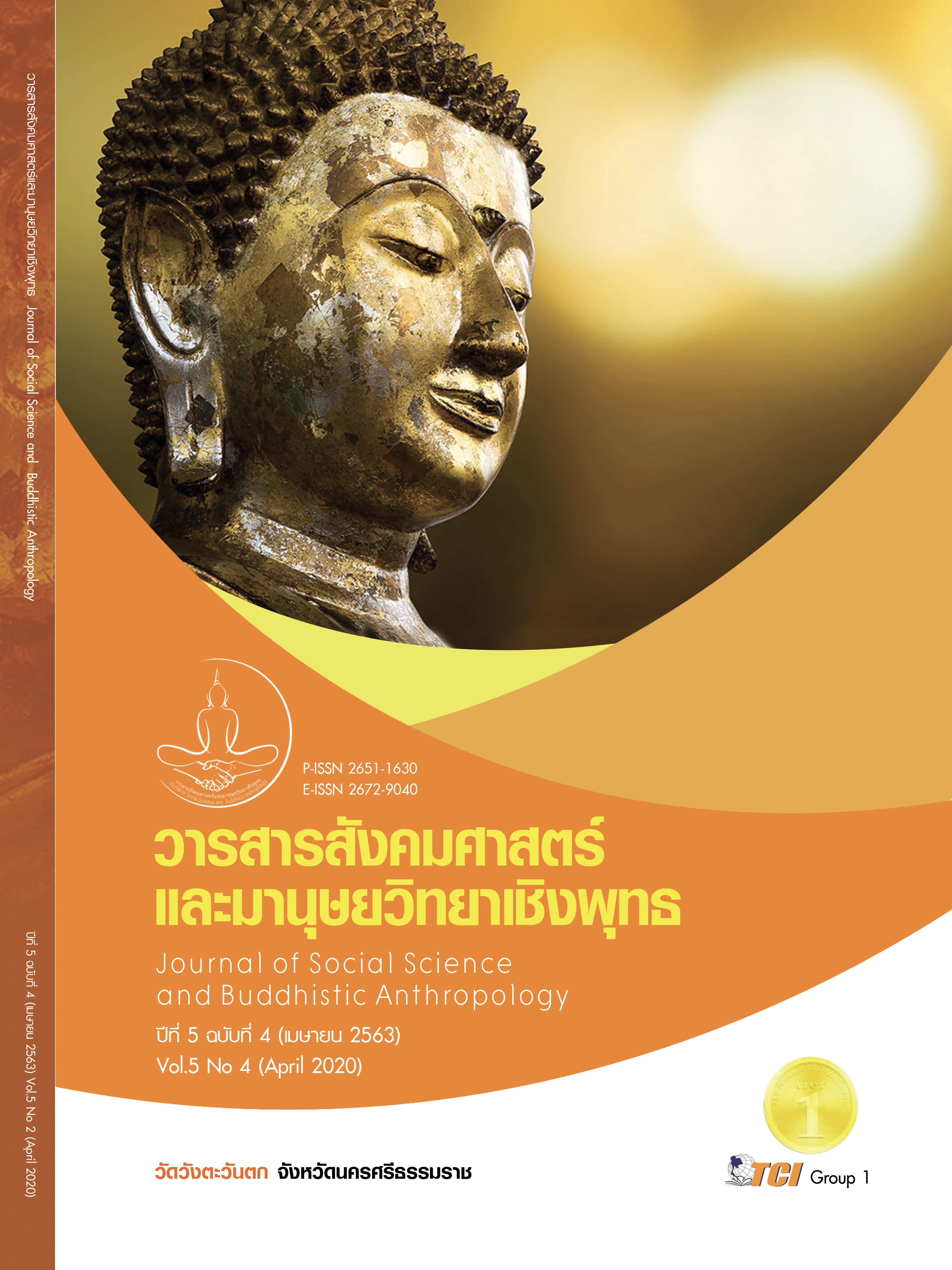DIGITAL CITIZENSHIP SKILLS OF CHIANGMAI COMMERCIAL TECHNOLOGYCAL COLLEGE STUDENTS
Keywords:
Instruction Management, Social Studies, Digital Citizenship SkillsAbstract
The objectives of this article were to: 1) Study the state of Social Studies instruction of Chiangmai Commercial Technological College students and to 2) Study the digital citizenship skills of Chiangmai Commercial Technological College students. The samples used in this study included 6 Social Studies teachers of Chiangmai Commercial Technological College and 59 second-year and third-year vocational students. The tools used in this research comprised of set 1: structured interview form regarding problems with Social Studies instruction interpolated in promoting the students’ digital citizenship skills and set 2: questionnaire about characteristics of students’ digital citizenship. The data were analyzed in form of analytical description, percentage, mean ( ) and standard deviation (S.D.). The research results were as follows. The state of Social Studies instruction of Chiangmai Commercial Technological College students showed that the administrators set the policy for Social Studies instruction by using various methods, encouraging learners to learn by doing, preparing teaching materials in accordance with the contents and organizing student-centered instructional process. According to the problems with Social Studies instruction, most interviewees commented that they had the problems with learners, such as they did not understand the contents, lacked attention and did not realize the importance of Social Studies learning, lacked analytical thinking skills and the skills for searching knowledge by oneself. The overall students' digital citizen skills were at the high level. When considering each aspect, it was found that the means of students’ digital citizen skills were at the highest level, namely self- defense/other protection. The followings were self-esteem/other respects and learning, developing/communicating with each other respectively.
References
กระทรวงศึกษาธิการ. (2553). แนวทางการจัดกิจกรรมพัฒนาผู้เรียน ตามหลักสูตรแกนกลางการศึกษาขั้นพื้นฐานพุทธศักราช 2551. (พิมพ์ครั้งที่ 2). กรุงเทพมหานคร: โรงพิมพ์ชุมนุมสหกรณ์การเกษตร.
ชรินทร์ มั่งคั่ง. (2561). องค์ความรู้หลักสูตรและการสอนสังคมศึกษา. (พิมพ์ครั้งที่ 2). กรุงเทพมหานคร: สำนักพิมพ์แห่งจุฬาลงกรณ์มหาวิทยาลัย.
เชษฐภูมิ วรรณไพศาล. (2560). ระเบียบวิธีวิจัยทางสังคมศึกษา: หลักการและการประยุกต์. เชียงใหม่: ครองช่างพริ้นติ้ง.
เชอริล เลมเก. (2556). นวัตกรรมจากเทคโนโลยี ทักษะแห่งอนาคตใหม่ การศึกษาเพื่อศตวรรษที่ 21. (พิมพ์ครั้งที่ 2). กรุงเทพมหานคร: บริษัทโอเพนเวิลด์ส พับลิชชิ่ง จำกัด.
ต้องตา จำเริญใจ . (2561). ความเป็นพลเมืองดิจิทัลของนักเรียนชั้นประถมศึกษาปีที่ 1-6 ของโรงเรียนในสังกัดสำนักงานเขตพื้นที่การศึกษาประถมศึกษาเพชรบูรณ์ เขต 2. ใน วิทยานิพนธ์ศึกษาศาสตรมหาบัณฑิต สาขาการบริหารการศึกษา. มหาวิทยาลัยเทคโนโลยีราชมงคลธัญบุรี.
ทิศนา แขมมณี. (2560). ศาสตร์การสอน. (พิมพ์ครั้งที่ 21). กรุงเทพมหานคร: โรงพิมพ์จุฬาลงกรณ์มหาวิทยาลัย.
ผู้ให้ข้อมูลสำคัญคนที่ 1. (30 มกราคม 2563). ทักษะพลเมืองดิจิทัลของนักศึกษา วิทยาลัยเทคโนโลยีพณิชยการเชียงใหม่. (จีระพรรณ สุศิริภัทรพงศ์, ผู้สัมภาษณ์)
ผู้ให้ข้อมูลสำคัญคนที่ 2. (30 มกราคม 2563). ทักษะพลเมืองดิจิทัลของนักศึกษา วิทยาลัยเทคโนโลยีพณิชยการเชียงใหม่. (จีระพรรณ สุศิริภัทรพงศ์, ผู้สัมภาษณ์)
ผู้ให้ข้อมูลสำคัญคนที่ 3. (30 มกราคม 2563). ทักษะพลเมืองดิจิทัลของนักศึกษา วิทยาลัยเทคโนโลยีพณิชยการเชียงใหม่. (จีระพรรณ สุศิริภัทรพงศ์, ผู้สัมภาษณ์)
ผู้ให้ข้อมูลสำคัญคนที่ 4. (30 มกราคม 2563). ทักษะพลเมืองดิจิทัลของนักศึกษา วิทยาลัยเทคโนโลยีพณิชยการเชียงใหม่. (จีระพรรณ สุศิริภัทรพงศ์, ผู้สัมภาษณ์)
ผู้ให้ข้อมูลสำคัญคนที่ 5. (30 มกราคม 2563). ทักษะพลเมืองดิจิทัลของนักศึกษา วิทยาลัยเทคโนโลยีพณิชยการเชียงใหม่. (จีระพรรณ สุศิริภัทรพงศ์, ผู้สัมภาษณ์)
ผู้ให้ข้อมูลสำคัญคนที่ 6. (31 มกราคม 2563). ทักษะพลเมืองดิจิทัลของนักศึกษา วิทยาลัยเทคโนโลยีพณิชยการเชียงใหม่. (จีระพรรณ สุศิริภัทรพงศ์, ผู้สัมภาษณ์)
พรชนิตว์ ลีนาราช . (2560). ทักษะการรู้ดิจิทัลเพื่อพัฒนาคุณภาพการเรียนรู้. วารสารห้องสมุด, 61(2), 76 – 92.
พักตร์วิภา โพธิ์ศรี. (2561). บทบาทการศึกษาต่อการพัฒนาความเป็นพลเมืองดิจิทัล. วารสารการศึกษาและการพัฒนาเพื่อสังคม, (14)4, 15 – 31.
วรลักษณ์ สงวนแก้ว. (2561). Digital Citizens : พลเมืองดิจิทัล. เรียกใช้เมื่อ 24 สิงหาคม 2561 จาก https://www.stou.ac.th/study/sumrit/1-59(500)/page2-1-59(500).html
เศกสรร สกนธวัฒน์. (2562). กลยุทธ์การบริหารโรงเรียนในเครือมูลนิธิเซนต์คาเบรียลแห่งประเทศไทย ตามแนวคิดการเสริมสร้างนักเรียนให้มีความเป็นพลเมืองดิจิทัล. ใน วิทยานิพนธ์ครุศาสตรดุษฎีบัณฑิต สาขาการบริหารการศึกษา. จุฬาลงกรณ์มหาวิทยาลัย.
สุวิทย์ เมษินทรีย์. (2559). สุวิทย์เมษินทรีย์ ดัน อว. ตอบโจทย์ไทย ก้าวสู่ประเทศพัฒนาแล้ว. เรียกใช้เมื่อ 24 สิงหาคม 2561 จาก https://www.matichon.co.th /politics/news_1634469









